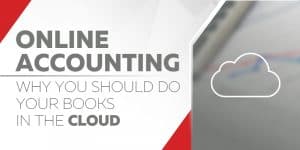Online Accounting: Why You Should Do Your Books In the Cloud in 2020
Online accounting has taken over the accounting software marketplace, with solutions to fit every industry and business type. Companies have made it simple to sign up and import data from your current program. Automated processes cut down on time spent performing routine bookkeeping tasks and reminders keep you on top of your business.
There are many compelling reasons to do your books in the cloud using any of the providers in our selection of the best accounting software. If you need convincing, we’re here to break them down for you.
Real-time Data

Doing your books in the cloud means you’ll never have to wait for a bookkeeper to enter your transactions to know how much cash you have in the bank. Cloud-based accounting software programs sync with bank accounts to pull in transactions. After you set up rules to match transactions to an expense type, cash flowing through your bank will be categorized for you.
Real-time data enables you to stay on top of your business’s finances, even if your bookkeeper calls in sick.
Built-in Backups
In addition to strong encryption and data protection, cloud-based accounting software providers offer free backup. With multiple data recovery servers, SSL encryption and disaster recovery plans, they can better protect your data than you might be able to on your own.
That said, if you think it wise to sign up for an online backup service, you should check out our best online backup providers for small businesses guide.
Always Accessible Data

Many of of the bigger players in the cloud-based accounting market, such as QuickBooks Online and FreshBooks, have invested in apps. Once you’ve downloaded an app to your phone and signed in, your data can be updated in real-time because you can access it anywhere at any time.
There are many advantages to that accessibility. If you’re on a job site and a client asks if they have past due invoices, you can check the app instead of calling a bookkeeper at the office. Some apps include built-in payment processing, so if they do have a past-due invoice, you can collect it right there.
Employees of project-based businesses that use programs with built-in projects functions, such as FreshBooks or Xero, can mark a task as completed while at a client’s or review an important file. Read our FreshBooks vs. Xero article for more information on those services.
Automated Processes
Many bookkeepers perform the same tasks on a weekly or monthly basis. Paying rent or electricity, invoicing clients and reconciling the books are examples of tasks that can become mindless and repetitive, which means they can also be forgotten.
No matter how good your bookkeeper is, they’ll take sick days or get busy with an important project and overlook mailing a bill. Most cloud-based accounting programs let users automate these payments in a few steps. For more information on a program that offers many automated functions, read our FreshBooks review.
Cloud-based accounting software will also send recurring invoices and automatic late payment reminders, as well as assign bank account transactions according to rules you define. Automating processes cuts down on user errors and forgetfulness.
Saving Time

Accounting and bookkeeping functions are cost centers because they generate no revenue for the business. Reducing the time and resources devoted to them frees resources to use elsewhere. While the automated processes in most cloud-based accounting software save time, the programs give you much more.
Businesses that bill by the hour won’t have to collect paper timesheets and manually input data if they sign up for FreshBooks’s project functions. Time tracking in the software, which employees can access through the app, feeds into invoices.
Two competitors, Sage and Xero, also offer projects functions. If you want to learn more about them, read our Sage review and Xero review.
Setting a reorder minimum for an important inventory item in Xero’s software ensures that you’ll never run out and miss a sale, plus you won’t have to run to the stockroom to check quantities. Reports on inventory turnover and best-selling items also take the guesswork out of deciding what to stock.
With built-in recurring processes, transaction matching for bank statements and reports that generate automatically from your data, doing your books in the cloud can save you a lot of time.
Ease of Use
While your organization might be large enough to employ a team to perform its accounting, for many small businesses, the owner is a jack of all trades and their skill set may not include bookkeeping. The good news is that most cloud-based accounting programs are built for non-accountants and known for being easy to use.
QuickBooks Online’s help library features step-by-step instructions with screenshots. FreshBooks embeds tips throughout it the first time you use it and Zoho Books makes page tips accessible through a light bulb icon in the software. Zoho Books is a smaller service, but has excellent expensing solutions worth reading about in our Zoho Books review.
Cloud-based providers offer tips and tutorials to get you up and running in no time. Embedded links to help articles and chat support ensure that you don’t even have to click away from your data entry to get your questions answered. If you’re using a traditional, out-of-the-box program on your computer, getting help will be a much less seamless process.
Tracking Business Performance

For a small business owner to succeed they must stay on top of the current receivables and payables and live in the future, planning for growth and income to cover expenses in a month or year. With cloud-based accounting software, you can do both.
Log on to any of the top programs and you’ll find a dashboard with an overview of your business’s status. Past due receivables, net income or bills coming due will be laid out in bar graphs or charts and paint a clear picture of your business’ health.
Financial reports delve deeper, condensing transactions and putting them into reports that can be analyzed to guide future decisions. Whether it’s a customer report comparing estimates to sales or an inventory report of best-selling items, they quantify your business. Once you learn to read them, they’ll become great decision-making tools.
The depth of reports offered varies significantly, though. Customized reports in QuickBooks Online better reflect your business than standard reports that can’t be changed. FreshBooks only has nine standard reports, while Zoho Books has a wide variety. For more information, read our FreshBooks vs. QuickBooks Online article.
Cloud-based accounting programs do more than track cash inflows and outflows. They take your data and generate tools to track your business’s performance and plan for your future.
Scalability
Many traditional software companies require that businesses purchase additional licenses for new users, which adds up quickly.
Cloud-based companies’ pricing plans typically allow a certain number of users to access the software and charge a flat per-user fee for additional employees. For example, FreshBooks accepts up to 500 users in its top tier. As your accounting team grows, it will be much less expensive to bring new users onboard.
A growing business also has more accounting needs. If you’ve begun selling across state lines or internationally, you may need to collect and file sales tax in different jurisdictions or convert transactions between currencies. There are accounting programs that offer both.
If you pick the right accounting program, it will scale up with you.
Inexpensive

Common across the industry, the three-tier monthly pricing plan will also grow with you. The lowest tiers typically only unlock access to a few features, such as invoicing and expensing, with more expensive monthly plans adding more users, inventory or project management.
Options, such as payroll or merchant processing, can be added for additional monthly or per-transaction fees. There’s enough competition in the marketplace that most products and services are priced similarly.
With prices starting as low as free for Wave and rising to $60-$70, cloud-based accounting programs are still cheaper than software and licensing fees. For more information on Wave, check out our Wave review.
Final Thoughts
If you’re a small to mid-sized business, there are many compelling reasons to consider doing your books in the cloud. With the variety and breadth of options in the market, you’ll be able to find software to fit your needs.
Pricing is reasonable and scales with your growth, and the safety and accessibility of your data can’t be matched by desktop accounting software.
If you’ve been using a packaged software program, why are you thinking about switching to doing your books in the cloud? If you’ve made the switch, what do you see as the pros and cons? Let us know in the comments below. Thanks for reading.


 Dena Landon has an MBA from Capella University and has been working as an accountant for over fifteen years. As tallying numbers all day can numb the mind a little, she has taken to writing in her spare time to indulge in flights of fancy (well, not too fancy). Her work has appeared in Good Housekeeping, Salon, The Washington Post and several other publications even more illustrious, though she feels right at home at CommQueR.com.
Dena Landon has an MBA from Capella University and has been working as an accountant for over fifteen years. As tallying numbers all day can numb the mind a little, she has taken to writing in her spare time to indulge in flights of fancy (well, not too fancy). Her work has appeared in Good Housekeeping, Salon, The Washington Post and several other publications even more illustrious, though she feels right at home at CommQueR.com.